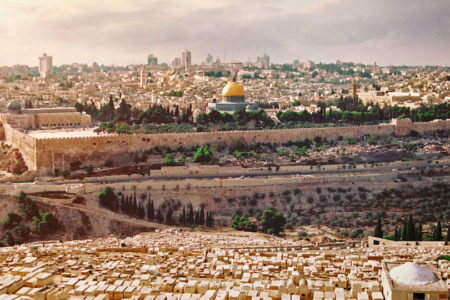The Election Results and the Peace Process
Where Are They Taking Israel?
On May 29, 1996, an election took place in Israel that brought about a complete reversal of policy in our nation. The left-wing government of Shimon Peres, which had been in power for four years, lost to the right-wing parties, led by Benjamin Netanyahu, who is now in charge.
Even though we have seen many reversals in the short history of the Knesset (the Israeli Parliament), this time it seems extraordinary. Only a few thousand votes brought about the change.
What caused this reversal in a country embroiled in the Peace Process? To understand the outcome of this election and the closeness of the vote, we must look at the events from the perspective of a few months ago.
The Israeli government signed agreements with the Palestinian authorities and gave them control over cities with a majority of Arab citizens, such as Nablus, Jericho, Bethlehem, Jenin, etc. As these territories have been turned over to Palestinian authority, terrorist attacks on Jewish citizens have become more frequent. Arab terrorists hit Jewish targets and then immediately flee into cities under Palestinian authority. Sometimes the escape is only a few minutes walking or driving distance! The Palestinian police occasionally arrest the terrorists, only to free them after a few days—secretly or under strange agreements.
While the Israeli government ministers think that “the peace is only a few minutes away” and explain constantly the near-future benefits of such a peace, Mr. Arafat is reported in the media to be talking about “different ideas.”
He tells “his” people that after Jenin, Nablus, Bethlehem, and Jericho, the return of Jerusalem and the remainder of “holy Palestine” will come. Mr. Arafat also declared, “If somebody does not agree with my plans, he can drink from the water of the sea!” In other words, he can drown. Mr. Arafat further claims that East Jerusalem was promised to him by the left-wing government. These kinds of “announcements” are still frequently in the news.
These statements may not have impressed the late Yitzhak Rabin and his partner, Shimon Peres, but they left an insecure feeling with many others in the nation.
The left-wing government overlooked the day-to-day problems and focused on the development of the vision of peace in the “new Middle East.”
The leaders looked upon the half of the nation who supported them in this process as intelligent people who are looking for peace. They saw the other half as unintelligent people who were looking for hatred and war, and they had no respect for them. They did not know how to guide or prepare the whole nation to undergo this process of building peace together.
Even before the election campaign, there were those urging the government to slow down and consider every possible response and concession because the nation was so divided. The leaders ignored these warnings and continued to trust in the righteousness of their own way.
Statistics showed an advantage for the government party, which increased their self-confidence and their lack of respect for their opponents from the right. They called the Likud-backed Jewish settlements in the occupied territories a big burden on security and claimed they caused “more problems than utility.” Guarding these settlements was portrayed as a waste of tax money.
Not only did the Jewish population understand the government’s words, but the Arabs also understood them very well. The terrorists felt that the blood of the settlers was “cheap” and hit them without mercy. In contrast, the government’s reaction was mild—a few warnings against the Palestinian Authority or the various terrorist organizations. Meanwhile, the terrorists continued to act freely, knowing that the left-wing government would not take action against them. They were afraid to jeopardize the Peace Process in which they had placed all of their hope.
The most drastic action taken by the government at that time was the closure of the territories, which lowered the number of attacks but did not stop them or hurt the terrorists themselves. Because Mr. Arafat was given responsibility for security within the Palestinian Authority, the Israeli Defense Force (IDF) abstained from entering the territories to attack those responsible for the terrorism. As a result, Mr. Arafat found himself responsible for the security of many Israelis. This was an unthinkable situation for most of them. Knowingly or unknowingly, the government pushed a sizable group of people into a corner, causing the weak among them to take the law into their own hands.
On November 4, 1995, at an evening peace rally, a religious zealot shot and killed Prime Minister Yitzhak Rabin. His assassination shocked the whole nation of Israel—those of all political opinions. From the left and the right, hurting people cried. The various parties and groups throughout the nation searched their souls and came to the conclusion that verbal violence only brings physical violence.
Although the verbal violence was present on both sides and had been for years, the Labor Party pointed toward the right wing (50 percent of the nation), blaming them for encouraging and causing the murder. For weeks after the assassination, people were ashamed to admit they belonged to the right wing, afraid that they would be seen as violent or inferior.
After the nation recovered from the terrible shock, the people were more divided than ever. Instead of trying to unify the nation, the government encouraged the media to paint the right-wing supporters as violent and against peace. This rhetoric only sharpened the differences and the hatred between the two factions.
While all of this was taking place, the terrorists were flourishing in the autonomous Palestinian areas and stepping up their attacks in cities throughout Israel. Bombs exploded in Jerusalem and Tel Aviv, causing devastating human losses. Although such attacks were not new to us, their increasing frequency and the lack of response from the government pointed out the weakness of the agreement with the Palestinian Authority.
If these events had taken place two years before the election, the government would have had time to work out solutions to the problems, and time would have healed many of the wounds. Unfortunately, that was not the case.
Then, just a month before the election, another event occurred. Following recurring attacks against the population in Northern Israel and the IDF, the government launched an operation against the terrorists in Lebanon.
Fearing another long war before the election, the media turned operation “Grapes of Wrath” into a propaganda ploy, but it did not bring any lasting results in the situation with Hizbullah, the Syrian-backed terrorist group in Lebanon. Although “Grapes of Wrath” showed the technical know-how of the IDF, it also showed that the government was incapable of resolving the problem of terrorism with force.
The agreement with Hizbullah was to bring silence until the election. After that—“God is Great!” (a Hebrew saying for the unknown future).
The problems with the Palestinians and terrorists in the north were not the only items on the election agenda, but they certainly were the most important ones. Other points of division were the compromise with Syria regarding the Golan Heights, struggles between religious and secular groups, and the upsetting election propaganda. A month before the election, the media began a new propaganda campaign: It urged the full and unquestioned support of all of the Arab parties for the left-wing government. It also urged the Meretz Party, which has great influence on a large number of people, to support the government. (Meretz is a secular, anti-religion party whose main interests are total equality for all, a Palestinian state beside the State of Israel, and the complete turnover of the Golan Heights to Syria in exchange for a peace treaty.) Meretz admitted openly that their primary concern was to help Shimon Peres build a Palestinian state beside the State of Israel. All of this occurred at a time when the Palestinian Authority was not doing enough to stop the terrorism that was growing in their midst.
Because the race between the two main candidates, Peres (Labor) and Netanyahu (Likud), was so close, the Labor party begged the Arab voters for their support to overcome the religious voters, who were backing Likud. Although the majority of Arabs want peace, they still would rather read “Palestine” than “Israel” on the world map. Their support of Peres led many Jews to think that if this government was so good for the Arabs, it couldn’t be good for Israelis. If our Arab enemies were so pleased with Peres, it should turn on a red light for us.
Another factor in the final outcome was that the election procedure was different than in previous years. This was the first time Israelis voted with two different envelopes—one for the Prime Minister and another for their favorite party. In this way, people could put more religious power against the influence of secular parties and choose a Prime Minister after their own hearts. The same can be said for the Arab voters. With one voice they could vote for Peres, and with another for an Arab party.
After considering all of these factors, the people of Israel had to make a choice.
The election was won by the right-wing parties, with Benjamin Netanyahu elected as Prime Minister. The margin of victory was 29,457 votes. The outcome of the election brought to light what the nation had known months before. Since the beginning of the Peace Process with the Palestinians and the Syrians, there were two different voices to be heard: one for and one against the way the government was handling the process.
Everyone wants peace, but the way to achieve that peace was in dispute.
The nation now hopes that the process will continue, but at a slower pace and with more security. Israelis want to strengthen their own security and not that of their enemies. The nation wants to enter these fateful agreements unified—not leaving behind 50 percent of the population who do not agree with the plan.
The situation shows that the Middle East is moving toward a different future. The nations in the region have come to the conclusion that war is senseless and expensive and that reason dictates that they consider the path of peace.
The new method of election brought about two phenomena.
1. The formation of a party for new immigrants.
Despite all of the efforts to integrate the new immigrants (who comprise 11 percent of the population) into Israeli society, they still don’t feel like they belong.
The party for new immigrants (with 7 mandates in the Knesset) can foster issues that are important to them in much better and faster ways.
2. The power of the religious parties went up drastically.
Counting all of the religious parties together, they are third in size behind Likud and Labor. There were 23 mandates instead of the 16 in the election of four years ago.
What will happen to the believers in this new reality, where the religious factions have so much power and influence?
We must remember that there is still no law against believers. Many people in high positions give believers a difficult time—not because the law empowers them to do so, but because of their personal hatred toward believers.
As a believer, the following basic principles are clear to me:
First, the outcome of this election is not a surprise to God. His sovereignty is the same as ever. Second, true and everlasting peace will come only through the Messiah, Jesus, and not through a human peace treaty. Third, the purpose for believers on this earth has not changed. We must go on preaching the gospel of salvation through Jesus the Messiah, and that through God’s grace alone.








